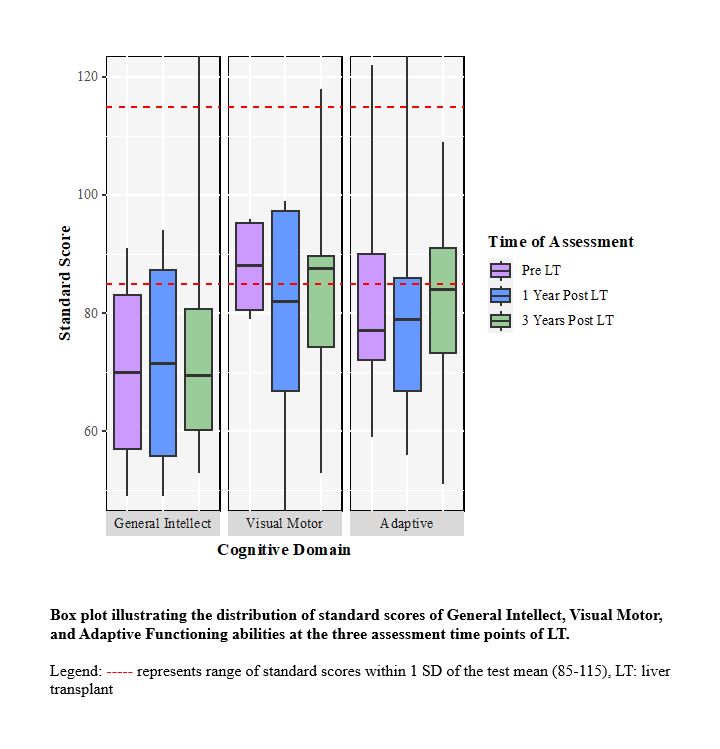Long-term neurodevelopmental outcomes following liver transplantation for metabolic disease
Anna Gold1,4, Catherine Patterson1,2,3, Stephanie So1,2,3, Leila Kahnami4,5, Alaine Rogers1,2,3, Andreas Schulze6,7, Vicky Lee Ng1,3,8, Yaron Avitzur 1,8.
1Transplant and Regenerative Medicine Centre, Hospital for Sick Children, Toronto, ON, Canada; 2Department of Rehabilitation Services, Hospital for Sick Children, Toronto, ON, Canada; 3University of Toronto, University of Toronto , Toronto, ON, Canada; 4Department of Psychology, Hospital for Sick Children, Toronto, ON, Canada; 5Department of Psychology, York University , Toronto, ON, Canada; 6Division of Clinical and Metabolic Genetics, Hospital for Sick Children, Toronto, ON, Canada; 7Departments of Pediatrics and Biochemistry, University of Toronto , Toronto, ON, Canada; 8Division of Gastroenterology, Hepatology and Nutrition, Hospital for Sick Children, Toronto, ON, Canada
Background: This study describes the neurodevelopmental outcomes of children with urea cycle disorders (UCD) and organic acidemias (OA) pre-LT, 1-year, and 3-years’ post-LT.
Methods: Retrospective chart review of children with OA or UCD transplanted between January 2014-December 2021. Standardized motor and cognitive assessment scores were collected (excluding children without >1 motor/cognitive assessment). Pre-LT brain magnetic resonance imaging (MRI) were graded. Associations between demographic/medical variables and neurodevelopmental outcomes were explored.
Results: Twenty-six children (64% male) underwent LT at a median age of 1.4 (IQR 0.71, 3.84) years; Fifteen (58%) had a UCD diagnosis, 14 (54%) required dialysis for hyperammonemia, and 10 (42%) had seizures typically around diagnosis. The proportion of children with gross motor scores less than 1 standard deviation (SD) of the mean increased across timepoints, and > 50% demonstrated general intellect scores >2 SD below the mean at each timepoint. Medical predictors included; diagnosis of UCD associated with lower general intellect (p=0.019), arginosuccinate lyase deficiency having lower visual motor scores (p=0.035) at 3-years post-LT; a history of seizures pre-LT associated with lower general intellect (>2SD below the mean) at 3- years post-LT (p=0.020); dialysis pre-LT associated with lower motor scores (>1 SD below the mean) at 1-year post-LT (p=0.039); pre-emptive LT associated with higher general intellect at 3- years post-LT (p=0.001). MRI gradings did not predict developmental scores in either direction.
Conclusions: Children with a metabolic diagnosis have a higher prevalence of developmental impairment post-LT compared to norms. Earlier screening, pre-emptive transplant, and rehabilitation may optimize long-term outcomes.

If you have any questions during the meeting, please go to the registration desk. Our emails will be monitored sporadically.
REGISTRATION DESK OPENING TIMES
Sunday, October 15, 16:00-18:00 Monday, October 16, 07:00-18:00 Tuesday October 17, 07:00-12:30